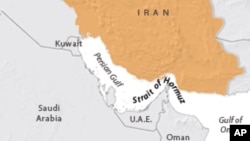Amid positive signals surrounding nuclear talks among Iran and Western nations, both the United Arab Emirates and Kuwait have quietly restored diplomatic ties with Tehran. Iran's Foreign Ministry indicated Monday that talks with Saudi Arabia over resuming ties are also going in a positive direction.
Eyes are focused on the bigger prize of a diplomatic rapprochement between Tehran and its long-time nemesis, Riyadh. Ties between Iran and both the UAE and Saudi Arabia were cut in 2016 following the execution of Saudi Shi'ite cleric Nimr al-Nimr.
Iranian Foreign Ministry spokesman Nasser Kanani told journalists Monday that the positive regional climate is bolstering optimism over the possible resumption of diplomatic relations with Saudi Arabia. Both Iraq and Oman have helped broker unofficial talks between Tehran and Riyadh.
Kanani says that Iran has made efforts to improve ties with Saudi Arabia and has seen reciprocal steps from the Saudi side. We are optimistic, he says, that the positive regional atmosphere is fostering the path of communication and dialogue, and ultimately, better relations.
Kanani went on to say that serious differences and thorny issues still divide Tehran and Riyadh but that "positive steps have been taken" on the negotiating track.
Khattar Abou Diab, who teaches political science at the University of Paris, tells VOA that the nuclear talks in Vienna have created a positive regional atmosphere that is contributing to improved relations between Iran and former adversaries Saudi Arabia and the UAE.
He says the Saudi-Iran talks in Baghdad and improving ties between Turkey and Saudi Arabia have created the impression of a calming of tensions in the region and a logic of discussing differences rather than pursuing a path of conflict.
Abou Diab argues that "despite several attacks by Iran's Houthi allies on the UAE, trade ties between the Emirates and Iran were never broken, and a good neighbor policy still prevails."
Washington-based Gulf analyst Theodore Karasik tells VOA that both the "restoration of diplomatic ties between the UAE and Iran is important in the current changing strategic environment."
He noted that "more interaction with Tehran by the Emirates is seen as a necessity because of geography and economic recovery from the pandemic and other issues. Both sides will still disagree on policy objectives, but at the same time, they need the formality (of relations) to cooperate, negotiate and argue over theaters where their interests overlap, besides the Gulf."
Paul Sullivan, a Middle East analyst at the Atlantic Council, tells VOA that trade between Iran and the UAE was "at its height in 2017 ... dropping to a trickle after the countries severed relations." He notes that there "may be 500 to 600 thousand Iranians in Dubai."
He adds that "GCC-Iran tensions, the war in Yemen and Iran's support of Hezbollah and other terror groups in the region have caused serious consternation in the UAE."
"The fact that the UAE is sending an ambassador to Iran," he argues, "does not mean that all is well. More likely," he argues, "it means that greater understanding is needed to develop future relations. U.S. sanctions still apply to Iranians in the UAE and to financial and other arrangements between the UAE and Iran," he notes.




